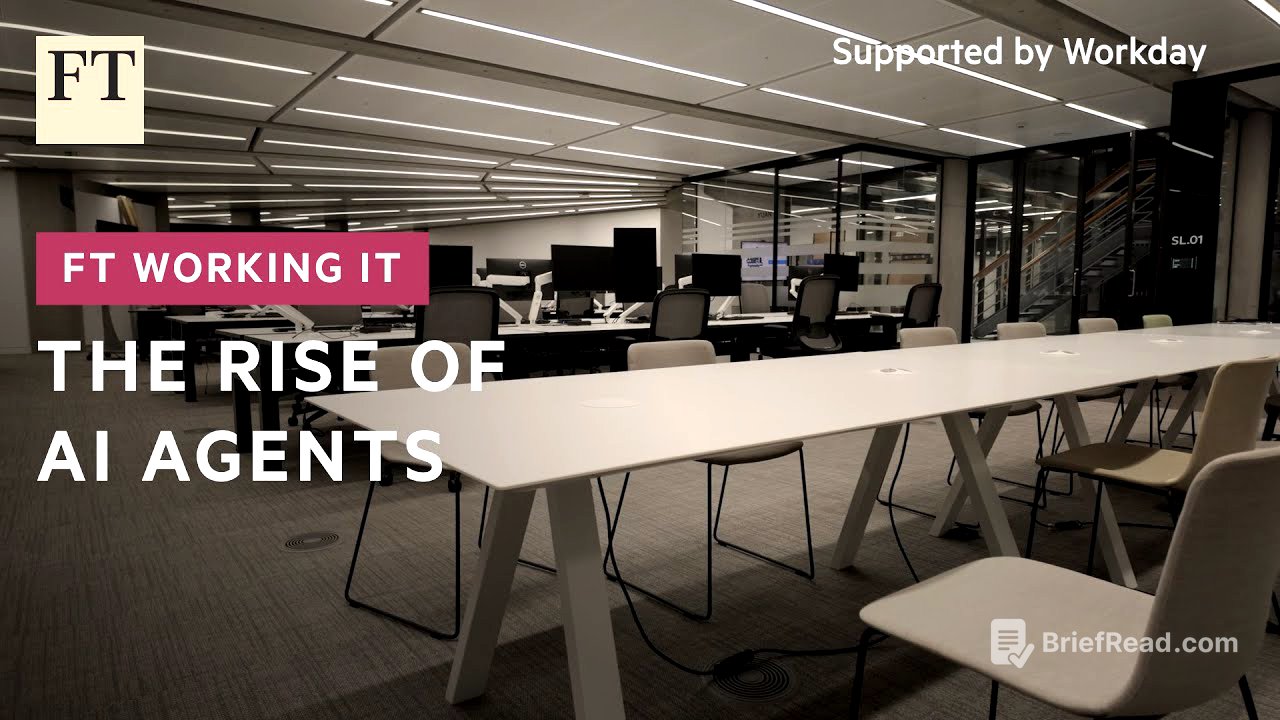TLDR;
This video explores the rise of Agentic AI in the workplace, defining it as AI capable of autonomous decision-making and task completion. It examines the potential impact on jobs, organisational structures, and the human element of work. The video balances the hype surrounding AI with practical considerations, addressing concerns about job displacement, misplaced trust, and the current limitations of the technology. It also offers insights from industry leaders on how to navigate this evolving landscape, emphasising the importance of human skills like creativity and strategic thinking.
- Agentic AI is defined as AI capable of autonomous decision-making and task completion.
- Experts suggest AI could reshape traditional organisational structures.
- Concerns exist around job displacement, data privacy, and the potential for misplaced trust in AI.
- Human skills like creativity, complex judgement, and strategic thinking will become more important.
- Companies are cautioned against "agentic washing," where the capabilities of AI are overstated.
Introduction to Agentic AI [0:03]
The world is entering a period of rapid change driven by technological advances, with workplaces already experiencing the impact of Agentic AI. This AI can learn on the job and perform multiple tasks, joining human teams as autonomous agents. Agentic AI has the potential to revolutionise work and team management on a scale not seen in a century. The presenter, Isabelle Bareric, will explore the pressing issues surrounding the future of work and speak with senior leaders about making work better.
What is Agentic AI? [1:18]
Agentic AI is described as a technology that, once set up with access to platforms and processes, can autonomously carry out tasks until completion with minimal human supervision. While some in the tech sector envision completely autonomous AI handling tasks like stock trading and customer interaction, agents are already being used in workplaces to approve expenses, onboard workers, and collaborate on projects. Major tech firms have launched tools aimed at completing complex tasks with little human input, such as OpenAI's Chat GPT agent, which can analyse information and devise plans.
Industry Leaders' Perspectives [3:00]
Colette Stallbaumer, co-founder of the Microsoft Work Lab, notes that leaders are currently ahead of employees in adopting AI strategies, though only a small percentage of companies have fully implemented their AI plans. She emphasises that those who haven't started are already behind. Melissa Hula, the FT's AI correspondent, suggests that much of the AI hype may be overstated, as companies struggle to find practical applications for the technology despite significant investment. The fear of missing out (FOMO) is driving adoption, with optimists hoping AI will reduce workplace drudgery and free up employees for more creative work.
The Changing Nature of Work [5:12]
Zigg Sarapin, CEO of Qualtrics, envisions a future where AI handles repetitive, rules-based tasks, allowing humans to focus on creativity, complex judgement, strategic thinking, and craftsmanship. This shift could make organisations less rigid and more focused on human connections. He suggests that work that can be automated should be, freeing people to focus on more human aspects of work.
The Impact on Organisational Structures [6:29]
Agentic AI has the potential to disrupt traditional organisational charts by replacing humans in certain roles. This could have profound effects on the future of work. Rachel Botsman, a trust expert, discusses the concept of a "trust leap," explaining that humans naturally resist change and prefer the known and safe. As workers grapple with the implementation of AI agents, concerns arise about job losses, privacy violations, and the potential for misplaced trust in technology.
Agentic Washing and the Reality of AI [9:10]
Melissa Hula introduces the concept of "agentic washing," where tech companies overstate the capabilities of Agentic AI to drive sales. Truly autonomous AI does not yet exist due to technical challenges and the fact that AI still makes mistakes. Companies are partnering with customers to refine AI applications, acknowledging that the technology is not yet a finished product and requires ongoing testing and oversight. The high cost of AI research and development is a significant factor driving the push to commercialise Agentic AI.
The Future of Jobs and the Agentic Revolution [11:15]
Despite concerns about job losses, it's argued that humans are still needed for ingenuity and creativity, as language models tend to produce statistically average results. While levels of optimism and investment in AI may be outpacing the reality of its current capabilities, leaders must be prepared for the Agentic revolution and its potential impact on the workplace. The tech world is excited about the possibility of one-person unicorns, but it remains to be seen if this will happen.









